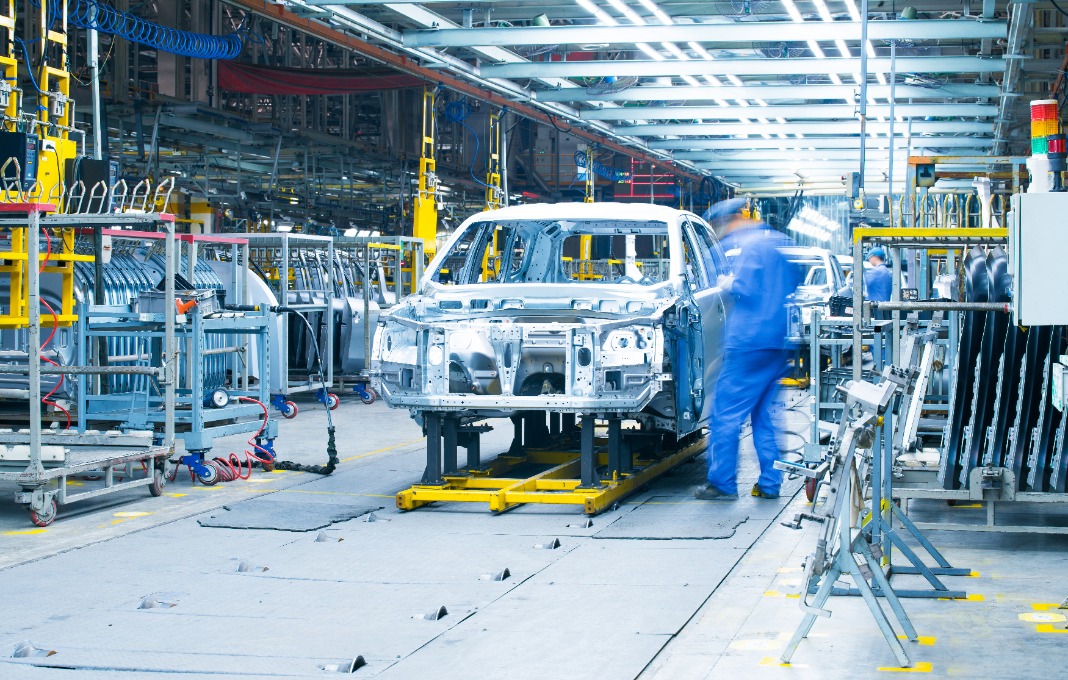The wheels are starting to fall off for suppliers to the American automotive industry.
Weakening consumer demand for vehicles has combined with the slowing of the electric-vehicle revolution to place auto suppliers from Tier One down through the ranks in new pincers that they weren’t experiencing even two years ago.
After spending the last five years adapting to black-swan developments—starting with Covid-onset operating restrictions, continuing with pandemic-era supply-chain debacles and then compounded by abrupt demands for production ramp-ups by automakers for their transformation to making EVs—CEOs at many auto suppliers already were dealing with major stresses. Then very recently the situation flipped, with OEMs scrapping or delaying major EV programs, and the momentum behind a post-pandemic surge in sales to American consumers seeming to leave the marketplace.
The latest stinging data point came this week, when major automakers including General Motors, Toyota, Honda, Kia, Nissan and Volkswagen reported lower September sales than the year before. Meanwhile, S&P Global Mobility recently lowered its overall 2024 U.S. sales forecast to 15.9 million vehicles from 16 million and said its outlook for North America light-vehicle output was also trimmed, to 15. 5 million, reflecting delayed vehicle launches and production cuts by some automakers to trim inventories.
“The market has shifted drastically,” Magna International CEO Swamy Kotagiri told investors on his latest earnings call. The remark was part of an unusual step by North America’s largest auto supplier to lower its outlook for its 2026 financial performance now expecting sales of only $44 billion to $46.5 billion, down about 10 percent from the amount it projected in February, and a lower EBITDA.
“We are seeing slower [EV] adoption than previously anticipated, particularly in North America and to a lesser extent in Europe,” Kotagiri told analysts. “As a result of this and a high degree of geopolitical uncertainty, OEMs are recalibrating their portfolios and capacity, resulting in program delays or cancellations and reduced volumes.
“We are taking a number of steps to address the new market dynamics we are facing,” Kotagiri continued, “demonstrating our commitment to margin expansion, capital discipline and free cash flow generation.”
Indeed, how Kotagiri spelled out Magna’s reactions to these developments is among suggestions for other suppliers to pursue:
Cut costs. Magna is “restructuring our complete vehicle cost base to adjust to lower volumes in the near term,” Kotagiri said, including “driving engineering spend reductions for 2026 of up to $200 million while ensuring that we continue to prioritize investments for the future. We are taking actions across our portfolio and footprint, focusing on optimization and cost reductions.”
Reduce capex. Magna also plans to cut its previously projected capital expenditures for 2026 by $200 million, Kotagiri said, resulting in an expected capex-to-sales ratio of less than four percent for 2026. That should boost free cash flow, he said.
Look to China. As much as it has jangled U.S. presidential politics, the realities of the EV market also are creating potential opportunities for major auto suppliers. As the EV “revolution” stalls in this country and picks up ground in China, Magna and other suppliers are looking to pick up business from Chinese companies making EVs for their domestic market.
Buddy up. The best automakers are willing to play the long game with suppliers, via strategic partnerships and cost-sharing, to help suppliers get through this transitional period. Toyota, for example, gets high marks for collaborating with suppliers and continues to lead an annual supplier-scorecard survey by accounting firm Plante Moran because of this approach.
Find the shoe on the other foot. Suppliers increasingly have been going to their customers seeking pricing adjustments to help deal with higher costs for labor and raw materials. But now, pressed by their own massive investments in EVs and other emerging technologies, OEMS and large suppliers increasingly are asking their suppliers to extend payment lengths or delay them outright.
“We advise [smaller] suppliers to take the [OEM or larger supplier’s] request at face value and ask: What would that do to their cash flow?” Adam Ratliff a partner in the Detroit office of Michigan law firm Warner Norcross + Judd, told Automotive News. “If the answer is, ‘It would be a little blip, but it’s not a big deal and would help out our customer,’ [this is] not the type of thing where every supplier needs to put their foot down. You can imagine more heightened concerns when accommodating would shutter their operations or harm their cash flow to the point they couldn’t pay their own suppliers, causing a raw material shortage because they haven’t been able to build up their supply base.”








